An abandoned building between Prishtina’s Dardania and Emshir neighborhoods has been completely transformed since it began being used a couple of years ago.
Left as an unfinished skeleton by the heating company Termokos, and later managed by the Municipality of Prishtina, in July 2016, the organizations Toestand from Belgium, and Info Quartier Mache from Switzerland, together with numerous local citizens and cultural activists from Kosovo started an intervention to revitalize the building.
It all started as part of an idea for utilizing and revitalizing public spaces for a community of citizens. Over the past couple of years, Termokiss has been taken over and transformed into a home for many, for people who wish to share their knowledge and experiences with others — and for anyone who has the desire and willingness to bring about societal change.
2018 has been a big year in Termokiss’s short history; the space has gained enough additional infrastructure to keep the community working within its walls all year round, and now has a new roof, heating, bathrooms and a new floor aimed at functioning as a coworking space. It has also been a year in which donor support has landed at the space, giving some wings to initiate larger ideas, providing a simple staff to organize the space and the community on a daily basis, and bringing life both inside and out.
The year has seen many new Termokiss activity clubs come to fruition, including clubs for self defense, chess, poetry, comedy and film.
To keep itself afloat, Termokiss has also continued to organize activities and festivals such as Krejt ka pak, the third edition of which was held this month.
To date, Termokiss has been defined by diversity and inclusiveness. It is about changing the concept of formal learning, about coming together to grow individually and as a group, about going beyond stigma and prejudice, and over all, utilizing a space that creates and facilitates the implementation of dreams and objectives.
K2.0 spoke with two of the space’s community organizers, Erleta Morina and Eljesa Beka, about the struggles to become an active space, bringing Termokiss to the neighborhood and keeping the community alive and kicking.
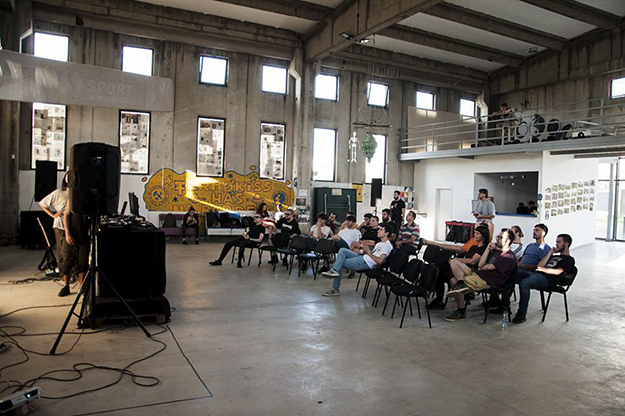
In the past two years, Termokiss has been transformed into a home for people who wish to share their knowledge and experiences with others. Photo courtesy of Termokiss.
K2.0: In the past few months, Termokiss has held many activities and different cultural events. How do you evaluate what you’ve done so far? What have you done to get to where you are today?
Erleta Morina: Ever since Termokiss was established, we’ve tried to create a space that is inclusive and has many objectives, including educating and empowering younger generations. The infrastructure was more about having a space to do all of that. Our community has always been active, working to achieve those objectives; even when we didn’t have a space that was usable during winter, when we didn’t have toilets or heating.
Still our community was active in trying to promote active citizenship not only among young people, but among people of all ages. All this is not only to move our country forward, as many people say, but also to share knowledge with people of all ages.
Eljesa Beka: Now we have heating, water and an energy supply, and the infrastructure is finished. Some of the stuff that we thought about doing a year ago, we’ve now done. Now we just need to keep the place alive and bring as many people in as possible. If there’s something that we’ve worked on it’s including all social groups. We’ve worked on the platform of the space and community, and we’ve tried to include volunteers in both the space and the community, so that things would go as they have until now.
What is Termokiss considered to be now?
Eljesa Beka: It is an alternative platform, a home for many. Personally, I’ve noticed the positive influence of Termokiss on people who don’t live in Prishtina. In addition to the people who live here and are closer to Termokiss, there are also people from other cities, which has been great for the locals. For me it is a home, and maybe I’ll end up always saying this, but that is what it is to me.
How would you describe this whole process of engaging the neighborhood, which remains a central part of your work? Have there been instances of prejudice or distrust from local residents in relation to Termokiss that have prevented your interaction with them? What challenges have you faced and what has surprised you the most?
Erleta Morina: In fact, this is one of the challenges that Termokiss has faced from the beginning. We never wanted to distance ourselves from the neighborhood, because we are located between Dardania and Emshir, two big neighborhoods. We’ve never wanted to be a place that people walk by, glance at and have no idea what’s going on inside. We’ve always wanted to have open doors.
We’ve worked in this direction, informing residents about what we do and why they should consider Termokiss as a space that also belongs to them as it belongs to all citizens. One of our many ongoing platforms is the neighborhood club.
Through this club we’ve undertaken different initiatives in the neighborhood, such as meetings with the residents of Emshir and Dardania, where we’ve asked them about their opinion of Termokiss, what criticisms they have, how we can be more open for these residents. Even the pupils of Dardania [Elementary] School see it as a place where they can come and hangout, learn and what not. We’ve taken all their critiques and proposals under consideration and together with these residents we’ve taken initiatives in Dardania and Emshir, addressing the issues that they face.
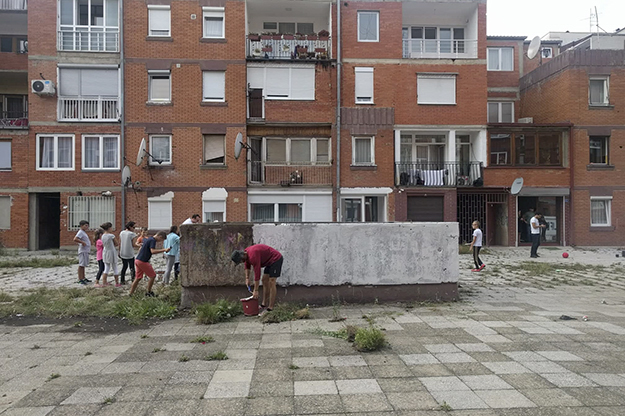
Termokiss has encouraged people from the neighborhood to get involved with activities such as cleaning in order to help create a sense of community. Photo courtesy of Termokiss.
Sometimes we’ve done graffiti paintings with the children in the neighborhood’s streets. They’ve been simple initiatives, but they have mobilized the neighborhood. What’s been even better is that residents of Emshir and Dardania have dealt with each other’s issues. It’s unified two neighborhoods, they have been unified by those initiatives, which are still ongoing. They’ve brought new people to Termokiss, and more importantly, people have taken the next step, understanding that Termokiss is truly here for all of us.
Now it’s great to come to Termokiss and to see pupils from Dardania School playing ping pong or having tea or what not. I see that they feel comfortable, that they have a new space.
When we consider the engagement of neighborhood residents, not only in the neighborhood in which Termokiss is located but also elsewhere, we can see that there is a lack of it. How has it been when you’ve gone house to house, door to door, inviting people to the space and to your activities?
Erleta Morina: This was one of the challenges, especially with the neighborhood club. Not only would people not come, they were also apathetic [about the idea]. We had a contact list and we’d call them to inform them about what was happening, inviting them to all activities — but they wouldn’t come. So what we did was we didn’t stop — sometimes we’d call them two or three times a week — then at some point they started to come.
We often went with flyers and posters to people’s doors telling them what Termokiss does, telling them that they’re welcome. Some just shut the door, some were very interested. Ultimately we saw that for these initiatives, what you need to do is just start.
We had a group of residents who were interested and what we did is we just started to take initiative. There was an outside space in Dardania that was sort of abandoned, and we decided to undertake many activities there. We cleaned it and painted it. We’ve actually just come from that space [now] — today we installed benches and rubbish bins!
Eljesa Beka: I personally didn’t have a sense of community until about two years ago when Termokiss was established. You can’t really blame residents of the neighborhood about not having a sense of community, not knowing about the concept of a community.
Twenty years ago [during the repression of Kosovar Albanians in the ’90s] only private properties were usable, and you couldn’t use anything outside of a two meter radius of your property — so there have been changes if you think about it. They are real changes, because people have started to understand what a public space is and how it can be used.
In the beginning, Termokiss was sometimes labelled as a place for ‘drug addicts,’ a dangerous label for a youth space. Has it been difficult for Termokiss to move beyond these labels and stereotypes?
Erleta Morina: In the beginning, when the space was cleaned up we found many syringes and other stuff. Residents had a tendency to think that the same people were still hanging out in Termokiss. That was where the stereotype stemmed from, especially among residents of the neighborhood.
They really only had to walk by once and say, ‘I’ll go in and take a look at what’s inside’ and go in and see that there are people thinking about innovative things, or what we define as innovative, about really changing society for the better and being active citizens — to inspire other people and future generations to share knowledge, experience and skills, so that they can work together toward a common vision. All they had to do was come and see that it’s not like [how they imagined it to be].
Eljesa Beka: A couple of years ago it was a place where addicted people got together, and it was very sad. In two years we’ve managed to bring about the opposite of that, but even addicts are welcome here. We’ve tried to help those people too. The place is also open to people that need help.
In the beginning they’d call us hipsters and junkies… it’s important that people don’t think that anymore, and if there are people who still do, I reiterate that if there are drug addicts, they have a space that they can come to. It’s a place where they can come and truly reflect about themselves, but I believe that people don’t think that about Termokiss.
Erleta Morina: They only need to come and see what’s happening and I know their minds will be changed. They just have to come.
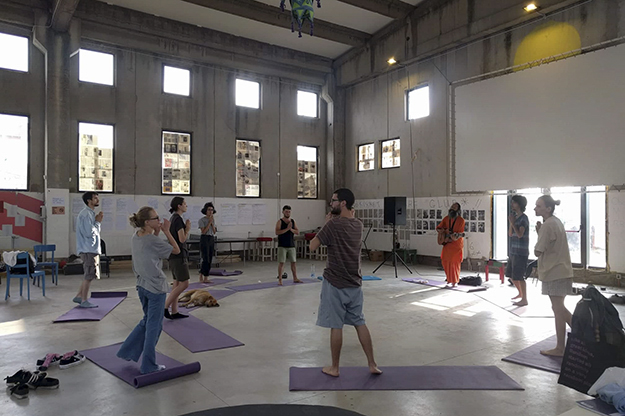
One of Termokiss’s varied club activities is the yoga and meditation club. Photo courtesy of Termokiss.
Can you tell us more about Termokiss’s clubs and their objectives? What results have they produced so far?
Erleta Morina: Termokiss’s clubs were born naturally in the first year. We were a very big group of people and we saw that we have common interests.
One of the first was the film club, because there were many film enthusiasts and they wanted to create a club and to screen films on a weekly or daily basis. For now we see clubs as different groups of people with common interests, and based on this we try to transmit those interests and skills to other people.
We currently have the following clubs: the neighborhood club, the yoga and meditation club, the chess club, the film and film production club, the music workshop, self defense club, the stand up comedy club, and we’ve also recently held our first two salsa sessions…
Eljesa Beka: …and whoever, whether an individual or a group, wants to start a new club, whatever it is, they can come.
Erleta Morina: The idea is not only to continuously develop activities, but also to transmit knowledge to other people, to exchange our experiences and knowledge, to learn about things that we currently don’t learn about in our education system.
In a way, to promote informal education through these clubs, but also through different activities. The activities that we’ve rejected are those that are for personal profit.
Eljesa Beka: We’ve also rejected religious activities so as to not cause conflict between religious people in our community. We can all have our religions here and everywhere else as long as we don’t promote one more than others.
Have other people sought help from you to create a space similar to Termokiss in other cities?
Eljesa Beka: In July, we revitalized a center in Tetovo and the idea is to do the same in Tirana next year, together with an organization from Belgium.
If you wait for institutional support, it may never happen. So what you need to do is either take [the space] illegally or squat, which is the common idea of taking over a space. And then [you can] obtain the support of the municipality initially, and after that you’ll get [other] institutional support.
I don’t believe anyone can stop you. If you want, you can see locations in your municipality, abandoned houses, see if they are public or private, take the list to the community, talk to the urban planning director or someone competent and go through with the procedure.
You need three to four devoted people and we could have not one Termokiss, but endless ones all over Kosovo. The idea is to disperse it to other municipalities, but it has to be compact here so that it can be dispersed outside of the municipality.
Erleta Morina: Termokiss shouldn’t be something special, but something that is in every neighborhood, so that people who live in Dragodan don’t have to come all the way down to Termokiss because they and every other neighborhood would have their own such center, multiple centers in each municipality.
You’ve the #mundësipërkrejt (OpportunitiesForAll) campaign for changing the law relating to the use of municipal properties. In Kosovo there are many public spaces, municipal properties that are abandoned and can be used. Even properties in the process of privatization that can be bought at a low price by municipalities, and given a public function. What legal changes are necessary? And what comes first: An active community or a space?
Erleta Morina: I think both the community and the space. Sometimes you have communities that have an objective, but might not have a space to realize it in, but at the same time the community is very important because if you have a space you will definitely attract a community, as was the case with Termokiss.
It’s very important to have a space, especially when we take into account how many abandoned spaces there are, many of which are public municipal properties — and this is not only in Prishtina, but all over Kosovo. That was the idea of the #mundësipërkrejt campaign.
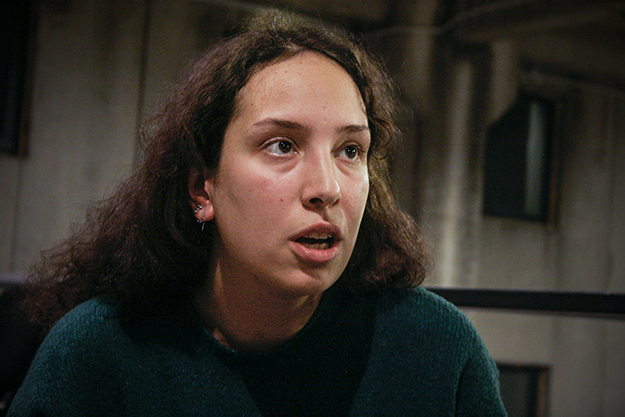
Erleta Morina says that her engagement with Termokiss has given her more confidence to express herself and her views. Photo: Besarta Breznica / K2.0.
The law relating to utilizing municipal properties states that a municipal property can be handed over to a person or entity but must be auctioned to whoever pays the highest price. This automatically disqualifies NGOs and other groups of people who are not businesses and do not have money to buy a property. This is the main issue with the [existing] law.
The law also states that you can take over a space if it contributes to public interest, so we focused more or less on public interest, because we showed that public interest doesn’t depend only on the income of a municipality or government, but also on community-based activities.
And we made a working group to research how other countries in the Balkans and Europe regulate public and abandoned spaces. One of the amendments we proposed was to determine a percentage of public properties that don’t go to businesses and don’t get privatized, but are rather used for civil initiatives, and to create a special process for groups that aren’t businesses.
Our community is comprised of many people and we wrote a proposal outlining the special process, and saying that a big percentage of the properties should be given to other groups. We did the #mundësipërkrejt campaign to change the law and simply highlight that public properties are for the public, for citizens. They can be transformed into centers such as Termokiss, or museums, galleries, or any other civil initiatives that bring about common good — not only diversity of culture, but also of people.
We expected only a few initiatives to support us, but in fact we saw that this was something that many other groups needed. A few months ago the government approved the law, but it still needs to be passed in the Assembly.
Eljesa Beka: Another change that could happen would be to enable people to register as community centers, because we are registered as an NGO because according to the law you can’t register any other way — that could be the next change.
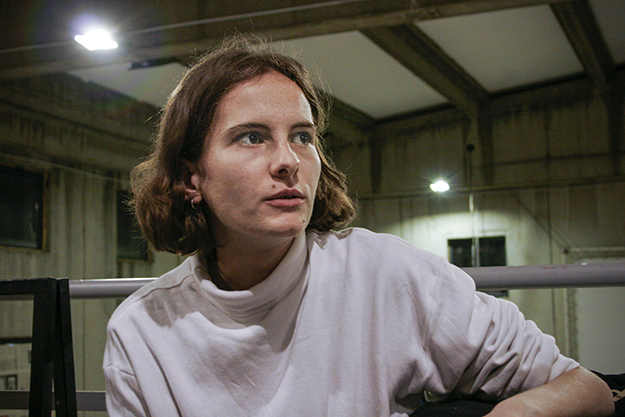
Eljesa Beka says she hopes community-led projects such as Termokiss can be dispersed to neighborhoods throughout Kosovo. Photo: Besarta Breznica / K2.0.
You mentioned that you were in Tetovo in Macedonia this summer and that you went to help out another space. Do you consider that independent spaces such as Termokiss and the one you helped to facilitate in Tetovo are a form of resistance against the privatization of not only cultural life but also public life and public services?
Eljesa Beka: For me the experience in Tetovo was something different because I wasn’t here at the beginning when Termokiss was established. I saw the revitalization process of a space from start to finish. It’s not easy, but it’s not something undoable. A form of resistance… I can’t really say resistance, but I can say that it is a form of change, maybe change is the only thing that is constant.
Erleta Morina: I think they are forms of resistance not only against privatization. Of course we should resist things that we believe are bad and are not suitable in our context, things that we don’t want in our society. But at the same time, it’s important not only to resist, but also to act against it. These centers can be considered as a form of resistance, but more so they can be considered as a counter-reaction, acting against what we don’t like.
For a public space such as Termokiss, what challenges are there in your attempts to avoid hierarchy? Can cultural centers and organizations be successful without being based on hierarchy?
Eljesa Beka: To be a horizontal organization, every Wednesday at 18:00 we hold our weekly meetings, as we have done for the past couple of years. We’ve done nothing in the last two years without getting approval from all the people who were there.
So, if you continue with the same tempo and have consistency, then horizontal organizations make for a situation in which no one is the leader, but at the same time everyone is. If we all feel responsible for something, it means we are taking responsibility for a cause that is bigger than ourselves or individual material benefits. Consistency in transparency has facilitated the horizontal organization concept.
Erleta Morina: And vice versa. A horizontal organization is not like a vertical organization, in which there is one leader from whom responsibilities trickle down to other people… We are all our own boss and we all have a sense of responsibility, not only as Termokiss, but also for the activities we do and our bigger objective.
We really encourage sincere and continuous communication, and this makes it easier to have a horizontal structure, so that no one takes more or less responsibilities than they need.
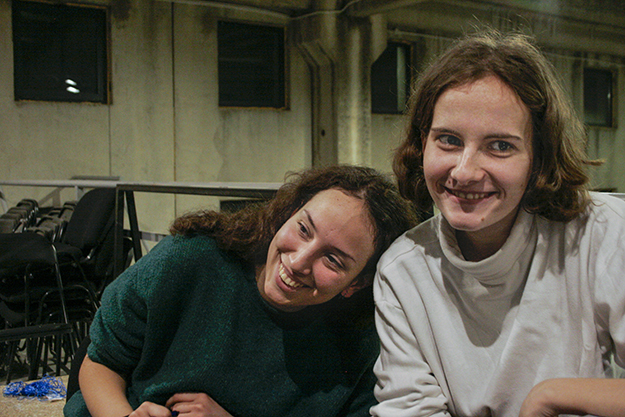
Erleta Morina and Eljesa Beka are two of the many organizers who are helping to build the Termokiss community. Photo: Besarta Breznica / K2.0.
Termokiss’s influence in the community is constantly growing. How do you stand politically, not in terms of political organizations but rather as a voice of advocacy. For example, in Europe and other places in the world, spaces similar to Termokiss are quite engaged in political and social resistance. Will Termokiss start such activities, or will you continue to be objective in this respect?
Erleta Morina: We are a very big community of people and answers vary depending on who you ask. What we’ve said until now is that we’re non-partisan, but that doesn’t mean we are apolitical. We’ve never come out with a statement about what we support, but that could be implied by our activities, the way we’re organized and simply what we do. By lobbying for public spaces and for allowing citizens to use them more for the benefit of the country, we imply what we support.
Eljesa Beka: Termokiss is a center for mobilization for many things, things of common interest, a center where we can mobilize for example against air pollution. You don’t need to support a political party for something that happens to you as soon as you leave the door of your home. So it can be a center for mobilization, but personally we are non-partisan.
When you started your work here you were a self-sustaining community, whereas now you’ve started to get support from donors. Is there concern about the potential of being restricted by donor limitations? What are you doing to preserve self-sustainability and your independence?
Erleta Morina: The support is a result of the tireless work that all the people involved have put in. It’s not only support, it’s more facilitation so that we can take Termokiss forward, and progress with the idea and concept that we want to develop. But this doesn’t mean that we will be limited to that template or those criteria that other people set, and we won’t forget the common vision that we have for Termokiss. In the near future, Termokiss will be self-sustaining and will be based completely on self-sustainability.
We try to do that through the space in which we are now, which is a co-working space. We will use it as a co-working space where people come and pay a symbolic annual or monthly sum to contribute to the space, and we will use the income to cover internet and other daily expenses.
Termokiss was identified as an idea and brought to life. What future do you see for Termokiss? What do you expect in 2019? Where will you focus?
Erleta Morina: In 2019 we want to focus on different ways of learning and informal education, because we don’t believe our education [system] is appropriate in its current state. Taking into account that there are different ways in which people learn, there is no sense in putting everyone in the same system to learn the same things, because it simply doesn’t work in our opinion.
We’ve decided to focus on informal education because of this, and to conduct different research about what our people truly need, about how our education system can be improved and how we can learn from the experiences and knowledge of one another, by sharing our skills.
Eljesa Beka: We hope to achieve self-sustainability in 2019 and then move on with courses or alternative ways of learning. This is not only for people that come here, but also for us.
You mentioned before that Termokiss is like a home in which you learned how to engage in a community. How has this influenced you personally?
Eljesa Beka: I wouldn’t be in Prishtina today if it weren’t for Termokiss. I would have left Kosovo, maybe for good. It’s a very big change, making me stay in my country. I’ve seen how much power we have to change things. To each individual or group that comes to Termokiss we must continuously give space for expression, so that they are known to every individual, so that we know how to channel them — some are more sensitive, some are not, some are good in some things…
Erleta Morina: I’ve become much more vocal. I’ve always had many thoughts, but I’ve never expressed them. Maybe I didn’t have that space outside the house in which I could be comfortable to express myself. Termokiss has changed this for the better, because I’ve noticed that people often think that what they say will have no influence, but in a platform like Termokiss, what you say happens. It’s very important to express your opinion and be vocal, to say what you’re thinking, be it within the community, about what we want to do as Termokiss, or about our common vision.
Eljesa Beka: And it’s very important to take responsibility even if you don’t know how to do anything. You take responsibility and you learn, and you learn many other things along the way.K
This conversation has been edited for length and clarity. The interview was conducted in Albanian.
Feature image: Besarta Breznica / K2.0.








